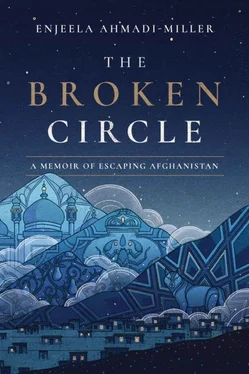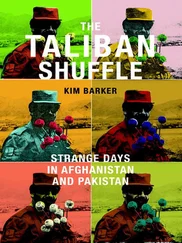I told her my dream was to return to Kabul and wait for a handsome prince, all decked out in the most gorgeous clothes, to come and ask for my hand in marriage. We’d have the greatest engagement party ever. I would be married at the Kabul Hotel, just like Shahnaz and Saleem. My wedding would be just as grand. I’d wear a green dress for the nikkah —the first part of the ceremony, where the bride and groom exchanged vows and signed the marriage contract. And I’d wear the most stunning white dress for the ceremony afterward. And there would be thousands of guests to celebrate with us. My prince would ride a horse or drive a car or fly a plane—I didn’t care, but I believed he would come for me one day.
After I finished, Mina was silent for a long while. Her eyes had grown large. She spoke very softly when she told me that weddings in her village were not like that at all. People didn’t have much money or many clothes. They did wear the traditional green dress but wore it for both parts. She’d seen lots of weddings, I sensed, because she seemed to know exactly how they were done in the village.
I could see in Mina’s eyes that she had a yearning to see the world beyond her village of dirt hovels and the tedium of grueling chores.
“Would you like to come to Kabul with us when we return? You could be my sister,” I said. “You can go to school with me and learn to read and write.”
Her smile came alive, but she said nothing.
The next day I went to meet Mina in our usual spot. She wasn’t there. I looked everywhere, but I couldn’t find her. The same happened the following day. I told Laila I was worried something had happened to her, and she said I should just keep to myself. No one knew what went on around the villages. I couldn’t believe that she didn’t seem to care. On the third day, I found Mina waiting for me. Deep-purple and red bruises mottled her neck and face. She looked like she’d been in a desperate fight. She tried to play, but she was still in a lot of pain. She never said what happened, so I pestered her.
She finally told me that she had been beaten. I asked why her parents would beat her.
“Why are your parents so mean to you?” I asked.
“They’re not my parents,” she said. “That man’s my husband. That woman is his other wife. They don’t like me to play with you so much since I have a lot of work to do taking care of the little kids.”
All the village sounds disappeared for a moment as I tried to understand what she had just told me. She studied her hands and pulled at the cloth of her peran tumban. I thought of the old man’s ugly face and angry grin. All the light in her eyes left. They filled with tears. “He bought me from my parents when I was seven.”
I didn’t know how married couples did it, but I knew they had children, the details of which seemed to be made of mysterious things—things older girls would whisper about. I knew that a man had to court a woman and be desperate for her to get her to marry him, and a girl should be much older than seven to be courted. My parents certainly didn’t sell Shahnaz to Saleem.
The only thing I knew about marriage was what I learned from my sister. Husbands were supposed to be in love with their wives—like Saleem and Shahnaz, and Snow White and her prince. I tried to think of some encouraging words to lift her spirits; she looked so defeated—not like the joyful Mina I had met just a few weeks ago.
I asked her about her family, but she couldn’t remember what her parents were like or where her home even was; she had been so young when she left. She’d been in the village with this man and his other wife for more than two years. This gray existence had wiped away any memories of a happier time with her family. She had no hope or expectation of ever seeing them again. Shock ran deep inside me that parents could abandon a child for money. I knew wives didn’t walk away from their marriages. I was separated from my parents, but it was a different situation. We were on a journey to reunite as a family. But Mina would never see her parents again. She couldn’t even remember what they looked like. The whole world was closed off to her. She didn’t know anything about the world outside the sharp boundaries of her tiny life until I had shared my memories of Kabul. I wanted to cry for her.
Mina was going to spend the rest of her life as a slave. It made me angry. It made me so glad for my family and all that they had shown and taught me. I had such a treasury of memories inside me: My sister Shahnaz reading her romance novels to us kids. Mommy’s stories from the history of Islam and of Afghanistan, and the books and poems Padar would read to us of heroes and fairy tales on those dark nights when the electricity was out. I knew there was much more to know and explore than what had been forced on her. I could not let her continue to live like this.
I went to Laila and told her about what had happened to Mina, how her parents had sold her and she was the wife of that terrible old man who brought us food. Laila was already upset about staying in the village—this brought her to a level of rage. She agreed with me that we needed to leave and that we should buy Mina from the man and take her with us as a sister. She had the money to help.
Later that day, we spoke with Masood. We squatted in the dirt with him, speaking in low tones. Laila was beside me.
“We have to take Mina with us when we go,” I demanded.
“We can’t take her with us,” he said.
“Why not?” I said. “She’s just a slave here.”
“It would cause too much trouble.”
“We can buy her. I have money. Laila has more.”
He shook his head of long hair. I could see the resolve on his face.
“You have to know something,” he said. He glanced around as if he wanted to make sure no one would hear us.
“What?” I said with insolence. “What do I have to know?”
“This happens every day in Afghanistan.”
“What happens?”
“Little girls are sold to men like this every day. This is her lot in life. It can’t be changed.” Masood was deliberate and firm in his explanation.
Laila and I gawked at him.
He shook his head and looked off.
“We have to help her,” I said, not accepting that there was nothing he could do. Masood was a good man; he had helped us through so much already. Surely he knew this was the right thing to do.
“Enjeela, listen to me.” He settled his dark eyes on me, and now he wasn’t smiling. “If we try to help her in any way, it will put us all in great danger—you and you,” he said nodding to each of us. “And Zia and Zulaikha.” He rose and glanced down at us, unsmiling. “It is your lot to go on from here, and it is Mina’s to stay. No one can change that.” He turned from us as if he had more pressing things to do. I knew he wouldn’t change his mind. He was like Padar. He had made up his mind, and he expected us to accept his decision.
That day and all that week, I moved around in an anger-fueled daze. Every time I saw Mina and spoke to her, her desperation grew greater. She had lost that joyful sense of acceptance she had possessed when I first met her. It reminded me of my own desperation. I couldn’t help but think what happened to her could happen to me. Every bit of anger I felt about Mina’s situation, I felt for my own. I thought about Mommy leaving and Padar sending us away. Parents weren’t supposed to abandon their children. Our two plights mingled into an inferno of rage inside me. I wanted to forget I even had parents, that I even had a home.
Mina never mentioned the beatings again, but her fresh purplish welts said they hadn’t stopped. She seemed weaker, with less determination. I told her we’d perform namaz for her. I remembered how the mullah had sung the azan , the call to prayer, five times a day. And how we’d pray, say namaz together, or attend the mosque, the boys and men on one side, and the girls and women on the other. Here there was no azan , and no one said namaz either.
Читать дальше












